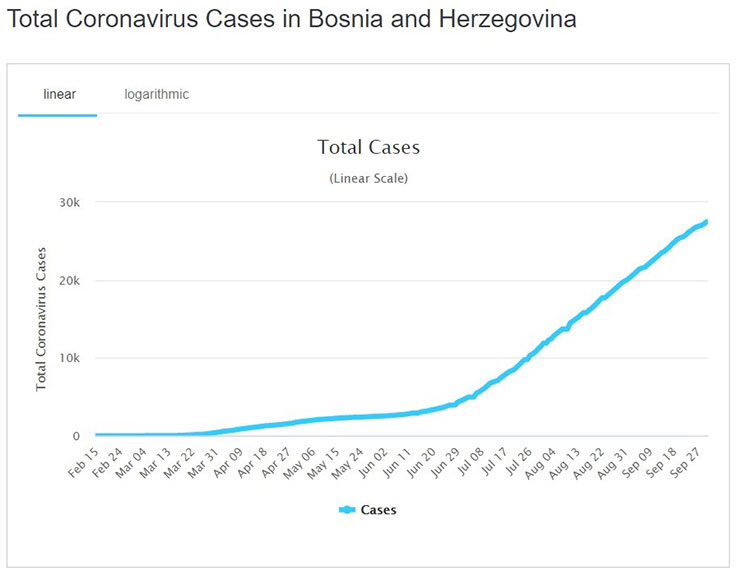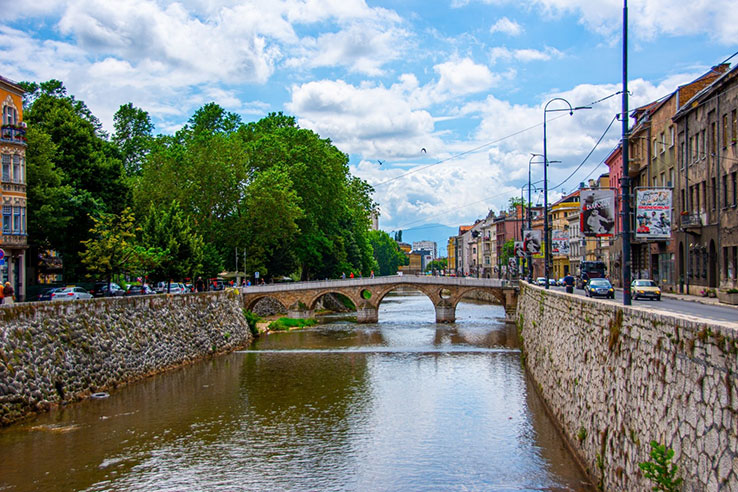Danijal Hadzovic
 This pandemic might be a chance to implement more profound economic reforms that are much needed for the country, and for which the crisis could be a great opportunity.
This pandemic might be a chance to implement more profound economic reforms that are much needed for the country, and for which the crisis could be a great opportunity.
Bosnia and Herzegovina initially decided to fight the coronavirus by introducing one of the most rigorous models in all of Europe. The model, introduced in March this year, included, among other things, a complete shut-down of all hospitality facilities and shopping malls, shops working shorter hours, i.e. until the afternoon, closing down borders for tourists and even introducing curfews. Treatment of citizens over 65 and under 18 years of age was especially strict, as they were completely forbidden to leave the house any time of the day!
The prevailing fear of the coronavirus and the consequences it could cause for the underdeveloped and understaffed health care system in BiH, initially overpowered the revolt that certain human rights activists and public figures showed against such measures. However, in the end, the Constitutional Court ruled: the decision to ban movement for those over 65 and under 18 was a violation of the BiH Constitution.
The authorities in BiH made decisions on measures to curb the spread of the coronavirus hastily and obviously not based on broader assessments of benefits and possible consequences, which is shown by the fact that, after the initial introduction of rigorous measures, before Eid al-Fitr at the end of May, they abolished almost all imposed strict measures and practically reverted to business-as-usual, or almost as it was before the introduction of the measures. Furthermore, the citizens, who were collectively kept in isolation for two months, reacted to the abolition of the measures with extremely nonchalant behavior, refusing to wear masks to massive gatherings in public places. The consequences soon became visible: BiH, from a country with one of the lowest percentages of infected persons, started to see a sharp rise in the number of infections.

Once the number of infections shot up, causing BiH began to appear on the red list of European countries, the authorities started to reintroduce restrictions. Of course, the authorities did not introduce a complete lockdown for fear of the catastrophic economic consequences it would cause, but instead enacted some new, more lenient measures, such as banning public gatherings in larger groups or prohibiting businesses to work past 11 p.m. This led to the cancellation or change of the organization of numerous events, such as the famous Sarajevo Film Festival - currently one of Sarajevo's most recognizable events; matches, as in the rest of Europe, began to be played without an audience; and cinemas and theaters began to operate with a limited number of visitors. However, the hospitality and tourism sectors suffered the most damage and showed the most revolt.
Economic consequences
The measures described above dealt a heavy blow to the economy of BiH, and for some of its segments they meant a complete suspension of work for a certain period of time.
As elsewhere in the world, the effects of the coronavirus have particularly affected the hospitality and tourism sectors. However, the question arises as to how the strict measures of the Government and the initial complete ban on work, and, after the abolition of measures, limiting working hours of food and drink establishments to 11 pm, further aggravated the situation and whether everything could have been done differently. Concerned establishment owners had no dilemmas on this issue: the state directly assisted the downturn of their business and forced them to lay off workers, without providing adequate compensation in return. As a result, food and drink establishment owners have repeatedly staged protests demanding that the government lift its measures.
One of the caterers, Almir Skoljak, the owner of a popular café in Sarajevo, told me that due to the coronavirus pandemic and government measures, he had to lay off as many as 12 workers:
- I kept on the workers as long as I could and suffered huge losses, expecting that the "lockdown" would pass quickly, however, help from the state did not arrive, business was not returning to normal and I had to lay people off.
The measure of establishments closing by 11 pm, as he claims, was completely meaningless and counterproductive:
“I can understand issuing measures stating that a mask must be worn, distance must be kept in cafes, all that is fine… But what exactly is the logic to limit work to 11 pm? Is it only then that the coronavirus comes out? Secondly, this does not solve anything, since instead of gathering in food and drink establishments, people started to gather in houses more often. So, the solution cannot be considered to promote safety and its only consequence is that it leaves the hospitality industry down millions in income, sending hundreds of workers to the employment bureau, Skopljak said.
And many BiH citizens, of course, resent not being able to stay past 11 pm on their evenings out and they question the rationale behind such a decision. Even in the Government of the Federation of BiH, there were requests to repeal this measure, but the proposals were denied and for now it remains in force as one of the measures to restrict the work of food and drink establishments.
 Source: emerging-europe.com
Source: emerging-europe.com
Nonetheless, with the exception of Neum - the only seaside town in BiH, which registered record numbers of visitors this year due to travelling hindrances, the tourism sector fared much worse even than the hospitality industry and recorded large losses overall. In addition to the naturally rapid decline in travel, state measures have certainly further contributed to this situation. The borders were closed, and the arrival of tourists was not allowed until mid-September, at the end of the tourist season. Due to all this, it is estimated that tourism, one of the fastest growing branches in BiH in recent years, has experienced a decline of 80% since the beginning of the coronavirus. Many hotels were closed, and a large number of travel agencies were forced to shut down their businesses. Precisely because of the closure of borders, tourism workers in BiH, just like the people working in food and drink establishments, have organized protests on several occasions across the country.
Edin Demirović is one of the people who were forced to close down their company. He founded his agency three years ago and he claims that his business has been going great due to the influx of tourists to Sarajevo in recent years. However, due to the coronavirus crisis, the business died out, there were no customers for months, which is why he finally decided to shut down the company:
"Simply, the borders were closed, and the locals began to travel less, except maybe to Neum. It is uncertain when tourism will resume. In the end, I had to lay off all my 7 employees and close the company, because simply, I don't have the money to pay such high expenses without any income, and the state has decided not to help ", Edin says.
Because of all this, tourism is estimated to have lost as much as a million KM a day.
Economic measures
The European Union has approved 857 billion dollars for its members to repair the damage caused by the effects of coronavirus, and there are a number of additional measures and instruments to fight coronavirus. On the other hand, the initial decisions for the Western Balkans are that a 3.3 billion-euro aid package is planned as part of the fight against the effects of the pandemic.
In Bosnia and Herzegovina, one of the poorest countries in Europe, the whole problem of complexity of the domestic political system and the unwillingness of domestic authorities and parties to take responsibility for the problems they face is evident even in the economic measures taken to repair the damage.
Thus, at the state level, 250 million KM of assistance from the EU for BiH were blocked. The reason may sound banal, but in BiH it is quite real: ministers from Republika Srpska in the Council of Ministers of BiH demanded that RS also be mentioned in the agreement with the EU on the allocation of aid.
The same Council of Ministers has not yet proposed any set of economic measures at the state level, and the government of the Federation of BiH has spent only 18 percent of the planned modest 488 million to help the economy. The only serious measures that have been taken so far are the decisions of the entity governments to pay for salary contributions for the months of April, May and June for the employers that will request such assistance.
Lessons (not) learnt
Due to the coronavirus pandemic, Bosnia and Herzegovina is projected to see a 5.5% GDP decline this year. Although the economic downturn, as in the rest of the world, was certainly inevitable, it is hard to shake off the impression that many of the government’s moves were made hastily, insufficiently calculated and without taking into account the consequences they will have on the economy. Namely, the initial assessment that it will be necessary to hold tight for a certain amount of time and that the pandemic will gradually pass with maximum restriction of movement and activity of the population, turned out to be incorrect. After the mitigation of measures, the number of cases of coronavirus infection in BiH has risen sharply, and now, in BiH as well as in the rest of Europe, it is clear that instead of lockdown we will have to learn to live with coronavirus and look for ways to adhere to measures and minimize as much as possible the risk of infections, at the same time trying to perform our usual activities.
It is obvious that measures such as banning movement after 6 pm or a banning the work of food and beverage establishments, banning tourists from entering the country, and even a recent decision to limit working hours of food and drink establishments until 11 pm, are completely wrong. “Yes” to wearing masks in hospitality facilities, “yes” to keeping distance between people and tables, “yes” to disinfecting hands and inspections, but it was obviously insane to ban people from working altogether and do so much damage to the economy, waiting for the coronavirus to pass on its own before a vaccine is found. “Yes” to all precautionary and protection measures, but it remains unclear why catering facilities are still forbidden to work after 11 pm, as if the virus only comes out after that time of day?
When it comes to economic measures taken by the government, with the exception of the decision to cover employees’ contributions for three months, most decisions are still waiting to be voted on, while businessmen are waiting for tangible help. Unlike Serbia, the authorities in BiH did not make decisions to pay money directly to citizens.
A significant decline in real gross value added was recorded in wholesale and retail trade, repair of motor vehicles and motorcycles, transport and storage, accommodation, and preparing and serving food, amounting to 25.3 percent, and in arts, entertainment and recreation, as well as other service activities it amounted to 12.6 percent.
What needs to be done
In order for the economy of BiH to be truly revitalized, what is needed besides aid packages are a number of comprehensive reforms that will create a far healthier foundation for the future development of BiH in the post-corona world.
A good step forward was made in 2016, when the Labor Law was adopted, which enabled much easier employment and dismissal compared to the previous one. Now, during the crisis, the Prime Minister of FBiH Novalic announced changes to the existing law that would, among other things, enable work from home, more flexible working hours, easier changes of salary levels, etc. It is the coronavirus crisis that has shown how significant the flexibility of work and working hours can be for the economy.
But perhaps the most important and comprehensive reform that should be done is the one concerning the deregulation of the economy in BiH. A particularly sore spot of the economy and the operation of the private sector in BiH is the veritable flood of complex, unnecessary and often contradictory regulations that take up most of the time, money and nerves of every entrepreneur and company, just to fulfill obligations to the state, instead of doing their job. This is confirmed by the World Bank's Ease of Doing Business Index, according to which BiH is ranked as low as 90th in the world, with particularly poor ranking of the procedure for opening a new business (184th place) and obtaining a building permit (173rd place).
BiH is one of the worst countries to start a business
To make matters worse, we often witness instances where this plethora of complex regulations are used by state institutions themselves as a means of pressuring certain business entities. From the Law on Companies through the Law on Crafts to the Law on Registration of Business Entities, it is necessary to make regulations as simple, understandable and specific as possible. Such regulations will help not only economic entities to fulfill their obligations more easily and work transparently, but also the state institutions themselves to more efficiently ensure the fewer, yet clearer rules of business. It is also necessary to significantly speed up the process of registering companies and obtaining permits.
In this regard, it is paramount to intensify the digitalization of public administration and enable businessmen to register and settle their duties to the state online. For years, various levels of government have refused to digitize to a greater extent and allow people to register online and resolve bureaucratic procedures online. However, the coronavirus crisis forced a good part of state institutions to start providing services to citizens online. So, with a little will and pressure, state institutions could technically be able to transfer most of their services online relatively easily, but it was obvious that the problem was some other factor.
A crisis can be a chance
In the long run, BiH has a great chance to attract investments from Western companies, especially if, due to problems and political tensions caused by the pandemic, they decide to look for new places to move their production from China. In order for any of them to be interested in considering our country as a potential investment alternative, it is necessary to ensure legal certainty, political stability, low taxes and simple business rules.
For years, reforms of this type have been hampered by various interest groups. Thus, for example, privileged budget employees together with trade unions opposed the liberalization of labor laws. They said, if contributions are reduced, there will be a decrease in budget revenues, less funds, etc. Now, however, there are no more ifs. The crisis will lead to a rise in debt, a reduction in budget revenues and, most tragically, a significant increase in unemployment, and a good part of the burden will have to be borne for the first time by the public sector, which no longer has enough tax money to continue enjoying its many privileges.
Previous fears have already come true, and privileges have been disrupted. The only rational solution that still remains is to finally pour fuel into the engine of the private sector, thus enabling it to pull society forward as quickly as possible.
This blog is published as part of the regional blogging initiative “Tales from the Region”, led by Res Publica in partnership with Analiziraj.ba (BiH), Sbunker (Kosovo) Ne Davimo Beograd (Serbia), PCNEN (Montenegro), Prlija (Croatia), ABCnews.al (Albania) and SEGA (Bulgaria).
Please refer to the Terms before commenting and republishing the content.
Note: The views and opinions expressed in this article are those of the author and do not necessarily reflect the views of the Institute of Communication Studies or the donor.


